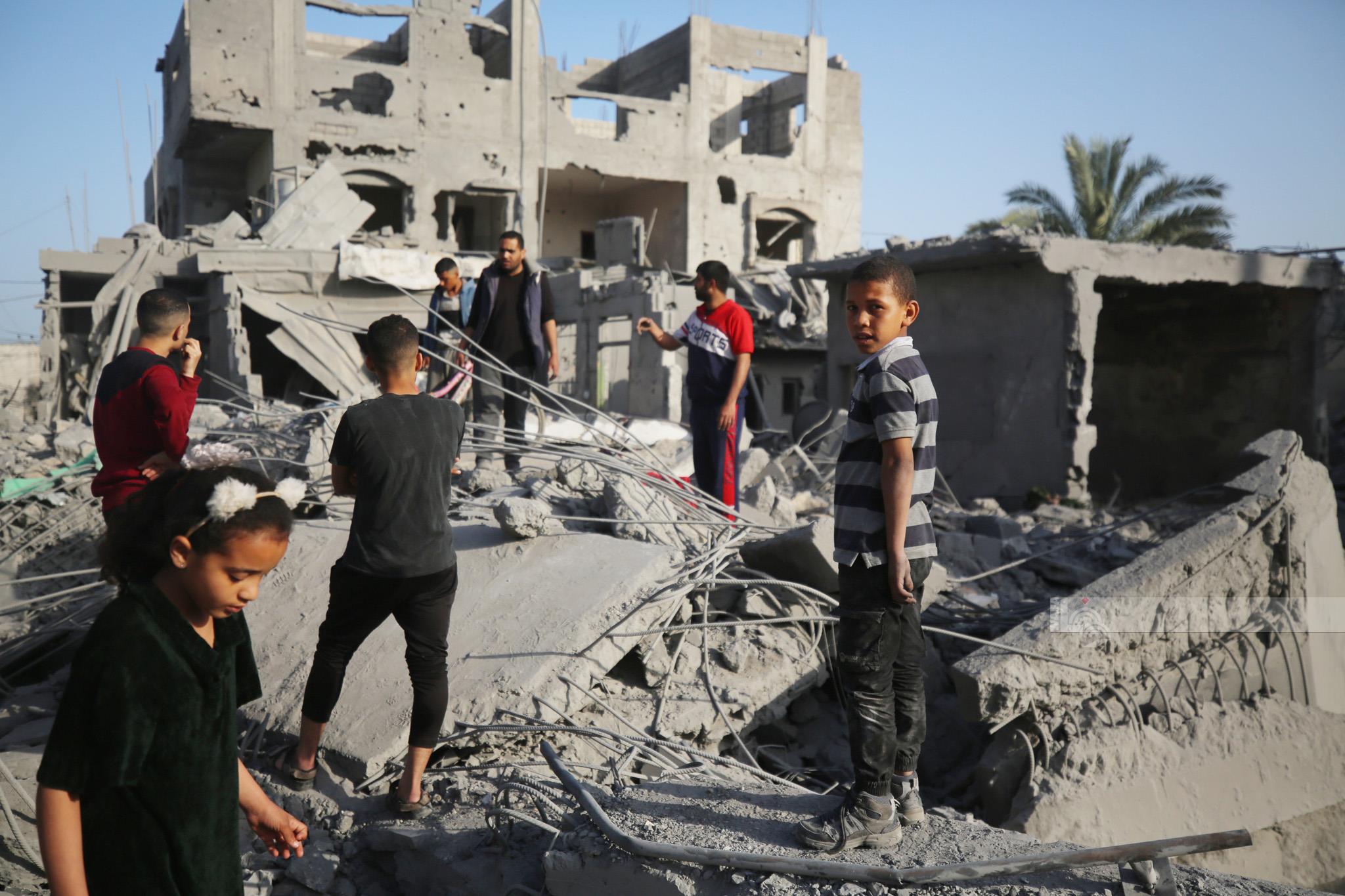The phone calls came as Egypt’s state-linked Al-Qahera News reported that a delegation from Hamas arrived in the country for talks over a new proposal.
Qatar’s Amir Sheikh Tamim bin Hamad Al-Thani and U.S. President Joe Biden discussed the latest efforts to reach a ceasefire in Gaza on Monday as talks have appeared to gain momentum this week.
“During the call, they discussed developments in the situation in the Gaza Strip and the occupied Palestinian territories, and the efforts of the two countries to reach an immediate and permanent ceasefire agreement in Gaza,” the Amiri Diwan said in a statement.
A separate White House readout on the call said both sides “discussed the deal now on the table to secure the release of hostages together with an immediate and sustained ceasefire in Gaza.”
Biden noted that Qatar and Egypt would work to ensure that the deal’s terms are fully implemented and praised the Gulf mediator for its diplomatic efforts, the statement said.
“He [Biden] urged Amir Tamim to exert all efforts to secure the release of hostages held by Hamas as this is now the only obstacle to an immediate ceasefire and relief for the people of Gaza,” the White House added.
Biden separately spoke to Egypt’s President Abdel Fattah El-Sisi on the same day regarding the deal currently on the table, though its details have not been publicly disclosed. The U.S. president also urged Sisi “to exert all efforts” to secure a deal.
The phone calls came as Egypt’s state-linked Al-Qahera News reported that a delegation from Hamas arrived in the country for talks over a new proposal.
The Egyptian outlet had cited Hamas official Sami Abu Zuhri, who confirmed the group’s trip to Cairo.
“We assured our brothers in Egypt and Qatar that we are serious about reaching an agreement, but we will not surrender to any American pressure,” he said, as quoted by the outlet.
Qatar and Egypt mediated a truce last year that lasted between November 24 and December 1 and led to the release of at least 109 captives from Hamas in Gaza.
While the talks stalled since the truce expired, they have appeared to gain momentum this week, as Israel recently doubled its threats to invade the southern city of Rafah in Gaza —something that has been a particular concern for Egypt.
Rafah is densely populated with more than one million people seeking shelter in fragile tents, including people forcibly displaced by Israeli forces from the north. The invasion of Rafah would be catastrophic and leave the population with nowhere to flee other than to neighbouring Egypt.
Egyptian foreign minister Sameh Shoukry also said on Monday that he was “hopeful” about the latest proposal without providing further details on the matter.
“The proposal has taken into account the positions of both sides,” Shoukry said, adding that his country was “waiting to have a final decision.”
Proposal under review
On Saturday, Hamas’s deputy chief Khalil Al-Hayya confirmed that the group received Israel’s response to its proposal, which it had submitted to the mediators on April 13.
In a statement, Al-Hayya said Hamas will announce its position upon reviewing the Israeli response.
A delegation from Hamas led by Al-Hayya reportedly returned to Qatar on Tuesday following talks in Egypt, sources told The National. The sources said Hamas’s delegation will hold discussions with the group’s members in Doha regarding the final response to the proposal.
“Israel is reluctant to commit to a permanent ceasefire and insists that the return of the displaced must be gradual,” said one of the sources.
Meanwhile, several media reports have been circulating some of the updates in the latest proposal.
Israel reportedly reduced the number of captives it wants Hamas to release to 33 instead of 40, including women, elderly and those who are ill, Israeli officials told The New York Times on Monday.
One of the officials said that the change was due to Israel’s belief that some of the initial 40 captives had died. Around 130 captives are still in Gaza, including some who are believed to be dead.
On April 17, Qatar’s Prime Minister and Minister of Foreign Affairs Sheikh Mohammed bin Abdulrahman Al Thani said the talks reached a “delicate phase” and said his country was re-evaluating its mediation role.
Some of the gaps that appeared throughout the negotiations are Israel’s rejection of a complete ceasefire and the unconditional returns of internally displaced Palestinians to the north. Israel has also repeatedly rejected Hamas’s demand to completely withdraw from Gaza.
Israel’s genocidal war in Gaza is approaching its seven-month mark with Palestinians in the Strip questioning when their suffering will come to an end.
Since the beginning of the war on October 7, 2023, Israel has killed at least 34,535 people in Gaza. Israel also displaced at least 1.7 million people, according to the United Nations.
The war has also left Gaza with only 11 partially operating hospitals out of an initial 36, including the Al-Shifa Medical Complex — the largest in the Strip and one of the biggest facilities in Palestine.
Under Israel’s efforts to deprive Palestinians of life-saving assistance, occupation forces killed 491 health workers, 252 aid workers, 183 UN staff, and 27 Palestinian Red Crescent members, according to the UN’s latest flash update on Monday.
Starvation under Israel’s complete blockade on Gaza has reached alarming levels, with at least 1.1 million people in Gaza facing catastrophic levels of food insecurity.
Basic ingredients, including aid boxes, are also being sold at inflated prices in Gaza.
Less than 200 trucks have been entering Gaza and do not contain fuel due to Israel’s restrictions on the type of aid that enters, according to the UN. The total number of trucks is significantly less than the pre-war daily average of 500.
Internally displaced people in Gaza are now grappling with the increasing summer temperatures, which could further exacerbate their suffering.







